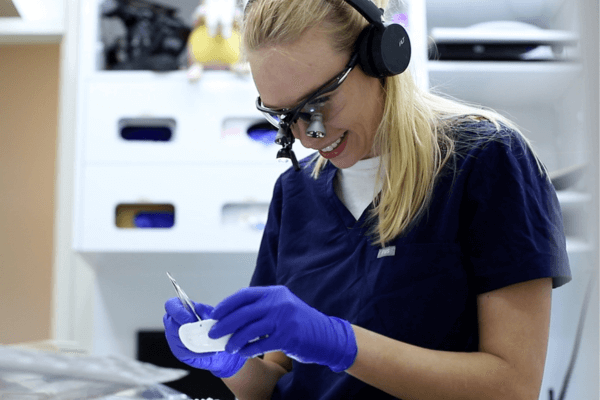You fought your way through dental school, passed the INBDE, and have begun your career as a dentist. Now, it’s time to find your connection with dentistry beyond the general basics. We’re talking about dental specialties. Even if you’ve been in the middle lane for years, it’s never too late to find your niche dental discipline that can help you elevate your skills and level up your career.
Below, we’ll discuss the different specialties within dentistry and how you can learn what you need to know.
Why Dentists Should Choose a Specialty
1. You Can Help More Patients
When you choose to learn specialty dental procedures and techniques, you can offer a broader range of treatment options to your patients. You’ll also have increased confidence in handling comprehensive care for specific dental conditions.
With the increase of successful advanced case management comes an increase in your reputation. Dentists who excel in one or more specialties are often sought after for complex or challenging cases.
2. You’ll Have More Career Opportunities
When you can communicate your ability to help patients reach their ideal smiles, your case acceptance rate will skyrocket. This creates an environment where you’ll receive a broader range of career opportunities and higher earning potential.
3. Personal Fulfillment
Expanding your knowledge and skills just feels good. Additionally, working on a greater range of cases can help you avoid burnout as it keeps your work from feeling monotonous.
6 Dental Specialties That Can Boost Your Career
1. Endodontics
Endodontics focuses on the internal structures of the tooth — the dental pulp. According to the American Association of Endodontists (AAE), less than 3% of all dentists are endodontists. Dentists in this specialty treat diseases and injuries that affect the pulp, which is necessary to save teeth when the internal structure has been compromised. In fact, endodontists are often referred to as specialists in saving teeth.
When you have learned advanced endodontics treatment planning for procedures such as root canal re-treatment or periradicular surgery, you can expect more patient referrals and a wider range of complex cases.
2. Periodontics
Periodontics focuses on the prevention, diagnosis, and treatment of periodontal disease. This includes non-surgical and surgical options to restore gum health and help patients reach their ideal smiles. This dental specialty is one of the most popular as it involves both oral health and aesthetics.
According to the National Institutes of Health, periodontal disease is the most common cause of tooth loss among adults, so a career in periodontics is full of both rewarding and challenging cases. When you can perform complex procedures such as crown lengthening, you’ll be able to offer more solutions to your patients, which will improve patient satisfaction and increase your potential earnings.
Learn more about periodontics.
3. Digital Dentistry
Digital dentistry is no longer a thing of the future, it’s here today and is creating promising opportunities for dentists. This dental specialty involves the use of technology for diagnosis, treatment planning, and even the delivery of dental care to accelerate or improve your procedure outcomes.
Common digital dentistry technology includes:
- X-rays
- 3D printers
- CAD/CAM systems
- Intraoral scanners
- And more
From using 3D-printing to make a crown in-office to designing a clear aligner treatment plan using the right software, digital dentistry is constantly evolving to provide more solutions for your patients.
4. Orthodontics
Orthodontics is the specialty for you if you’re interested in correcting misaligned teeth, jaws, and bite. Although traditional braces are the most common treatment in this specialty, there’s way more to like than colored rubber bands.
Clear Dental Aligner Orthodontics
Within the past few decades, clear dental aligners have taken orthodontics by storm. In fact, more adults are now looking for comfortable, aesthetically pleasing options to get their perfect smile. Plus, it’s now possible to help your patients quickly if you use TADs in coordination with clear aligners for a more focused approach to your treatment plan.
Learn more about aligner orthodontics.
5. Restorative Dentistry
Any procedure around replacing or repairing missing teeth is considered restorative dentistry. Common restorative dental procedures include:
- Fillings
- Crowns
- Inlays and onlays
- Root canals
- Dental implants
- Bridges
While it’s true that you may do some restorative procedures as a general dentist — such as two root canal treatments a week — you could increase those numbers exponentially if you choose this dental discipline.
Restorative dentistry is worth your while, as not only are you improving the oral health of your patients; but of all the dental specialties, restorative procedures can be the most lucrative, with some dental crowns costing between $500 and $3,000 USD. Restorative is a great introduction to learning more about the gums and includes sub-specialties such as endodontics.
Restorative procedure mastery is also a great way to gain confidence in your hand skills and surgical techniques, as the more complex cases require precision and in-depth knowledge.
Learn more about restorative dentistry.
6. Implantology
The self-explanatory dental specialty of implantology (implant = implant, ology = study of) can become more complex — and we think interesting — the more you dive in. From extractions to bone and soft tissue grafting to abutment placement, there are so many components to this specialty. Studying implantology provides an ultra-polished skill set that not even your best polishing tool could match.
We should mention that even a single dental implant can cost thousands of dollars (great for business), and implants are durable enough that 95% of them last at least ten years (great for your patient).
Learn more about implantology.
How To Choose a Dental Speciality That’s Right for You
Even if you know you should pick a specialty and start learning, you may be lost when it comes to how to choose what to tackle first.
Dental Continuing Education: Self Assessment
Before you begin thinking about what you want to learn, think about what you already know. Reflect on your current interests and consider what areas of dentistry ignite your passion and desire to learn.
Do you already enjoy performing surgical procedures when they appear on your schedule? Great! Implantology might be your calling.
Love perfecting smile design? Aligner orthodontics could be more your style.
You should also evaluate your strengths and clinical skills to identify gaps and learning opportunities. If you aren’t sure where to start, consider using an online tool that can help you gain an overall picture of your dentistry and suggest options for learning and dental discipline mastery.
Take your free career self assessment
Research Different Dental Specialties
Let’s face it. There are specialties within specialties. Even if you have the basics for many dental disciplines, some research can show you where to add to your skill sets. Talk to experts in different fields so you can gain insight into the requirements and skills necessary to advance your career.
Gain Clinical Exposure
Spend time observing or assisting dentists in different specialties so you can confirm your interest. Once you have narrowed your options, you can seek hands-on experience and mentorships to begin your learning journey.
Education Requirements
When you know what you need to learn, you can begin searching for the right dental education options. Education requirements can vary by specialty, but there are programs available to fast-track the learning process from the comfort of your own home or practice. However, no matter what dental discipline or education program you explore, you will need to plan for learning time every week.
Financial Considerations
If you are having difficulty choosing between specialties, you can assess your earning potential for each one. Although potential earnings should not be your priority, it can help as a deciding factor.
Master Dental Specialities With Us
Dental specialties are our specialty. We’re a community of instructors, dental learners, and dental professionals who want to improve the world of dentistry one hands-on learning experience at a time.
For more information about us and our Fellowships, go here: here.


